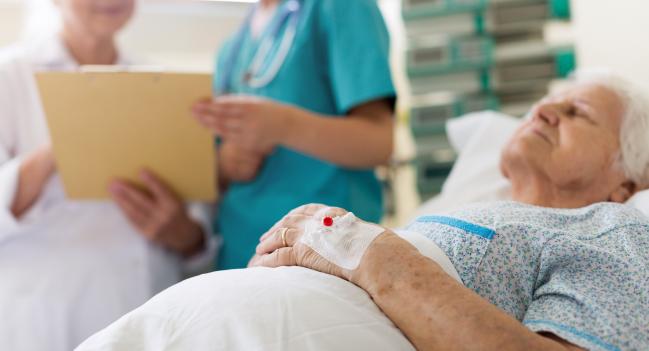COP-AF: Colchicine Doesn’t Cut Post-Op AF or Myocardial Injury
(UPDATED) Colchicine wasn’t effective in thoracic surgery, but there were some promising signals worth studying, say investigators.

AMSTERDAM, the Netherlands—The use of colchicine just before major thoracic surgery and for 10 days afterwards does not lower the risk of clinically significant atrial fibrillation (AF) or myocardial injury, the COP-AF trial shows.
The results, which were presented in the opening Hot Line session today at the European Society of Cardiology Congress 2023, indicated that there was a trend towards benefit, including a significant reduction in perioperative AF and myocardial injury among patients undergoing less invasive thoracoscopic noncardiac surgery.
Investigators say that while that’s a signal that should be further explored, there’s not quite enough here to broadly shift how physicians practice.
“The simple answer would be to say that there is not enough of a strong benefit—the primary outcomes were not significant,” lead investigator David Conen, MD, MPH (McMaster University/Population Health Research Institute, Hamilton, Canada), told TCTMD. “I think it will be hard to convince our clinical colleagues to use this systematically.”
If surgical patients are at high risk for AF or ischemic events, however, “considering [colchicine] is something that would not seem unreasonable,” said Conen. “You might consider it because it seems safe, but on a more widespread scale, it’s too premature to say we should use it.”
Cardiac surgeon Marc Ruel, MD (University of Ottawa Heart Institute, Canada), who wasn’t involved in the study, said the results, while negative, suggest there is “potentially something here.” These data, he told TCTMD, hint at a benefit in the overall population, but the reduction in perioperative AF and myocardial injury is more pronounced among those treated with the thoracoscopic approach.
This subgroup, he added, is also the more clinically relevant population given that thoracoscopic surgery is more frequently performed.
“We do know that thoracoscopic and robotic chest surgery brings a different, more targetable incisional inflammation than the open chest procedures,” said Ruel. “I see this every day with my robotic and minimally invasive cardiac surgeries versus the conventional incisional approaches. So, if I were a noncardiac thoracoscopic surgeon, I’d be encouraged by these results, and given the signal, lack of harm, and known other beneficial effects of colchicine, I’d consider using it in my own practice until more data—a composite safety outcome in thoracoscopic patients, for example—become available.”
No Benefit on Primary Endpoint
Colchicine is an anti-inflammatory agent that has been used for many years in clinical practice to treat gout, pericarditis, and familial Mediterranean fever. Recent trials have shown it can play an effective role in treating patients with coronary disease, too. In LoDoCo2, colchicine significantly reduced the risk of major cardiovascular events in patients with chronic coronary disease, while the COLCOT trial showed the anti-inflammatory was effective in reducing ischemic events in patients with a recent MI.
Those results paved the way for the US Food and Drug Administration decision earlier this summer to grant a new, cardiovascular-event-reduction indication for colchicine in adults who have established atherosclerotic disease or are at risk of developing it.
The COP-AF investigators initially planned to study the effect of colchicine on perioperative AF exclusively but added myocardial injury after noncardiac surgery (MINS), which includes myocardial infarction or elevated postoperative troponin caused by myocardial ischemia, as an independent co-primary endpoint following the publication of LoDoCo2 and COLCOT.
Conen said perioperative AF and MINS are common after noncardiac surgery and are associated with poor outcomes. MINS occurs in approximately 20% of noncardiac surgeries and is associated with a higher risk of MI, stroke, or death in long-term follow-up, while perioperative AF occurs in roughly 10% of thoracic surgeries and can result in longer hospital stays, symptomatic AF once discharged, and a higher risk of stroke and other adverse outcomes long term.
Using an anti-inflammatory drug has a mechanistic appeal. David Conen
“There's a clear need to try to prevent these two outcomes,” said Conen. “Previous studies have shown that both MINS and perioperative atrial fibrillation are associated with higher levels of inflammatory biomarkers in observational studies. People with higher levels of inflammatory biomarkers have a higher risk of perioperative AF and MINS, so using an anti-inflammatory drug has a mechanistic appeal, in addition to [the benefits seen] in other patient populations.”
The COP-AF trial included 3,209 patients (mean age 68 years; 52% female) without a history of AF undergoing noncardiac surgery with general anesthesia at 45 centers in 11 countries. They were randomized to colchicine 0.5 mg or placebo administered 4 hours before surgery and then twice daily for 10 days. Daily troponin measurements were taken for 3 days after the procedure while rhythm monitoring was done per standard care. Roughly two-thirds of patients underwent lobe resection surgery, while 20% had a wedge resection.
The primary endpoint of clinically important perioperative AF—defined as AF that results in angina, heart failure, or symptomatic hypotension, or AF that requires use of medication or electrical conversion—occurred in 6.4% of patients treated with colchicine and 7.5% of patients who received placebo (HR 0.85; 95% CI 0.65-1.10). MINS occurred in 18.3% of the colchicine-treated patients and 20.3% of the placebo group (HR 0.89; 95% CI 0.76-1.05).
In terms of safety, treatment with colchicine increased the risk of diarrhea (8.3% vs 2.4% with placebo; P < 0.001), although these events did not prolong the median length of hospital stay and led to only one readmission.
In a post hoc analysis that combined clinically significant AF and MINS, there was a benefit among the colchicine-treated patients (HR 0.84; 95% CI 0.73-0.97). Similarly, colchicine reduced the risk of vascular mortality, nonfatal MINS, nonfatal stroke, and clinically important AF in a post hoc analysis (HR 0.83; 95% CI 0.72-0.96).
Jean-Claude Tardif, MD (Montreal Heart Institute, Canada), the discussant following the Hot Line presentation, said combining MINS and AF into a composite endpoint is “difficult to justify” given the differing pathophysiology and clinical consequences of these two distinct adverse events.
He also highlighted some of the risk factors for perioperative AF in the setting on thoracic surgery, noting that older age, extensive surgery, pericardial resection, and the presence of concomitant coronary or valvular heart disease all increase the risk. In COP-AF, said Tardif, patients were relatively young and just 9% had preexisting coronary artery disease. Additionally, 75% were treated via thoracoscopy, which is associated with a lower risk of perioperative AF.
“In COP-AF, that population of patients probably had relatively low risk of atrial fibrillation,” said Tardif. “Sure enough, the incidence of perioperative atrial fibrillation at 7.5% was lower than the assumed rate of 9% in the statistical [modeling] of the study. That’s probably related to the lower risk profile of these patients and the use of thoracoscopic surgery.” In terms of ischemic events, Tardif noted that the incidence of MI was very low at less than 1%, as was the risk of stroke.
Thoracoscopic Subgroup
The researchers also performed a prespecified subgroup analysis based on the surgical approach. With less invasive, video-assisted thoracoscopic surgery, colchicine significantly reduced the relative risk of clinically important AF by 47% compared with placebo, whereas there was no effect seen in patients undergoing open surgery (P < 0.0001 for interaction). Similarly, colchicine significantly reduced the relative risk of MINS by 20% among patients undergoing noncardiac surgery via thoracoscopy but no benefit was observed in the non-thoracoscopic group (P = 0.04 for interaction).
To TCTMD, Conen said the COP-AF researchers hypothesized that they’d see a larger benefit in patients undergoing the more invasive non-thoracoscopic surgeries, but this didn’t turn out to be the case. He suspects that with non-thoracoscopic procedures, which involve a chest wall resection, there is a greater likelihood of disturbing the heart.
“There is a higher chance of a mechanical component,” he said. “This then leads to the release of troponin or irritates the heart enough to provoke atrial fibrillation. Mechanically induced atrial fibrillation or troponin release will not be prevented by a noninflammatory drug. It may be that in the use of thoracoscopic surgery, more events that we observe are due to inflammation and are then preventable with colchicine.”
Future trials testing colchicine might focus on patients undergoing these video-assisted thoracoscopic surgeries. In COP-AF, roughly 75% of the surgeries were performed via thoracoscopy, noted Conen. Tardif added there is also a need for large, well-powered clinical trials to determine the true value of colchicine to reduce the risk of AF after cardiac surgery, such as CABG.
Michael O’Riordan is the Managing Editor for TCTMD. He completed his undergraduate degrees at Queen’s University in Kingston, ON, and…
Read Full BioSources
Conen D, on behalf of the COP-AF investigators. Colchicine for the prevention of perioperative atrial fibrillation after major thoracic surgery—the COP-AF trial. Presented at: ESC 2023. August 25, 2023. Amsterdam, the Netherlands.
Disclosures
- COP-AF was funded by the Canadian Institutes of Health Research, Accelerating Clinical Trials Consortium, Alternative Funding Plan for the Academic Health Sciences Center of Ontario, Population Health Research Institute, Hamilton Health Sciences, Hanela Foundation, and Research Grants Council.





Comments